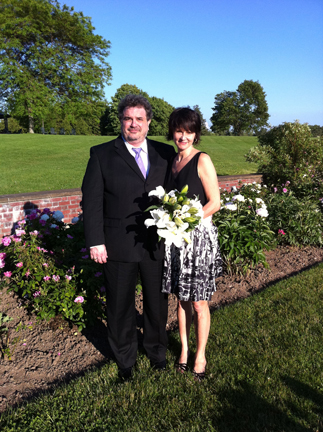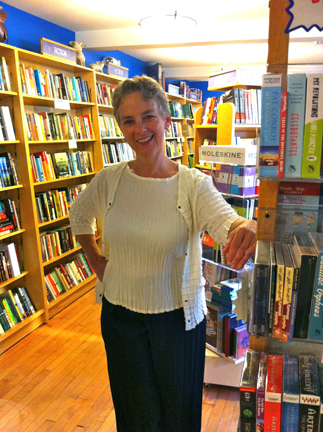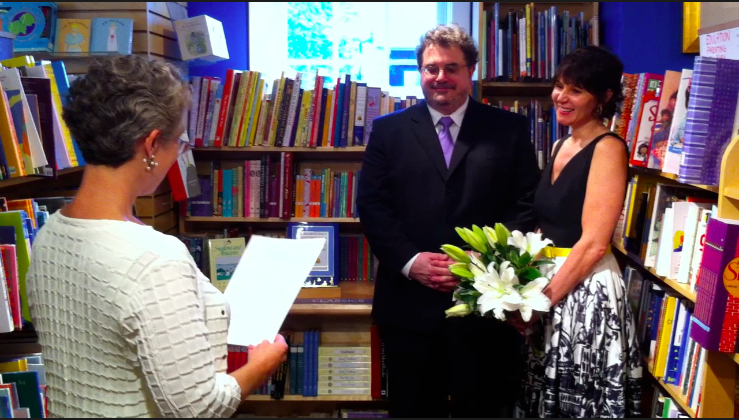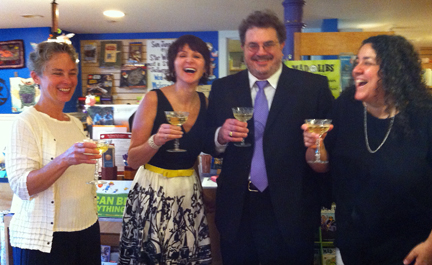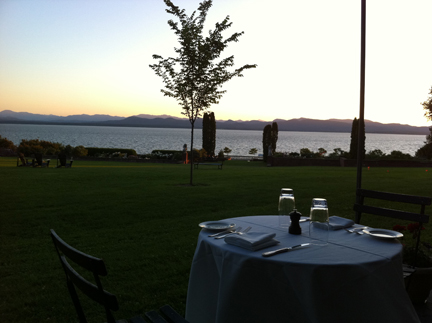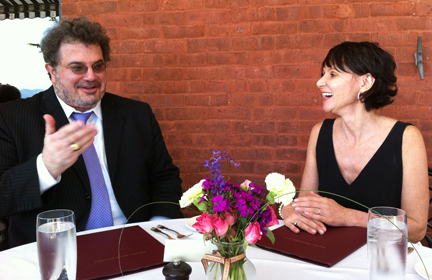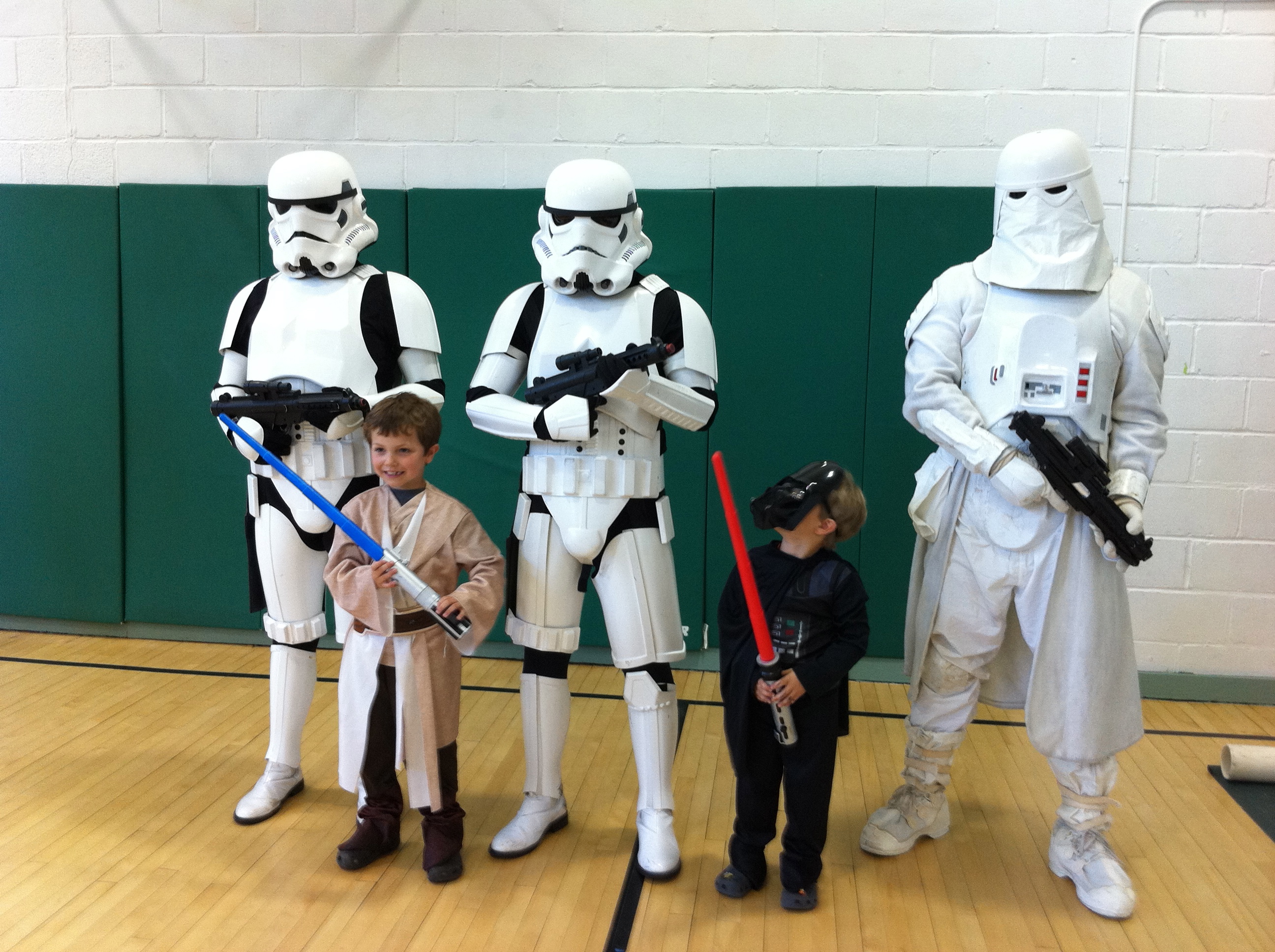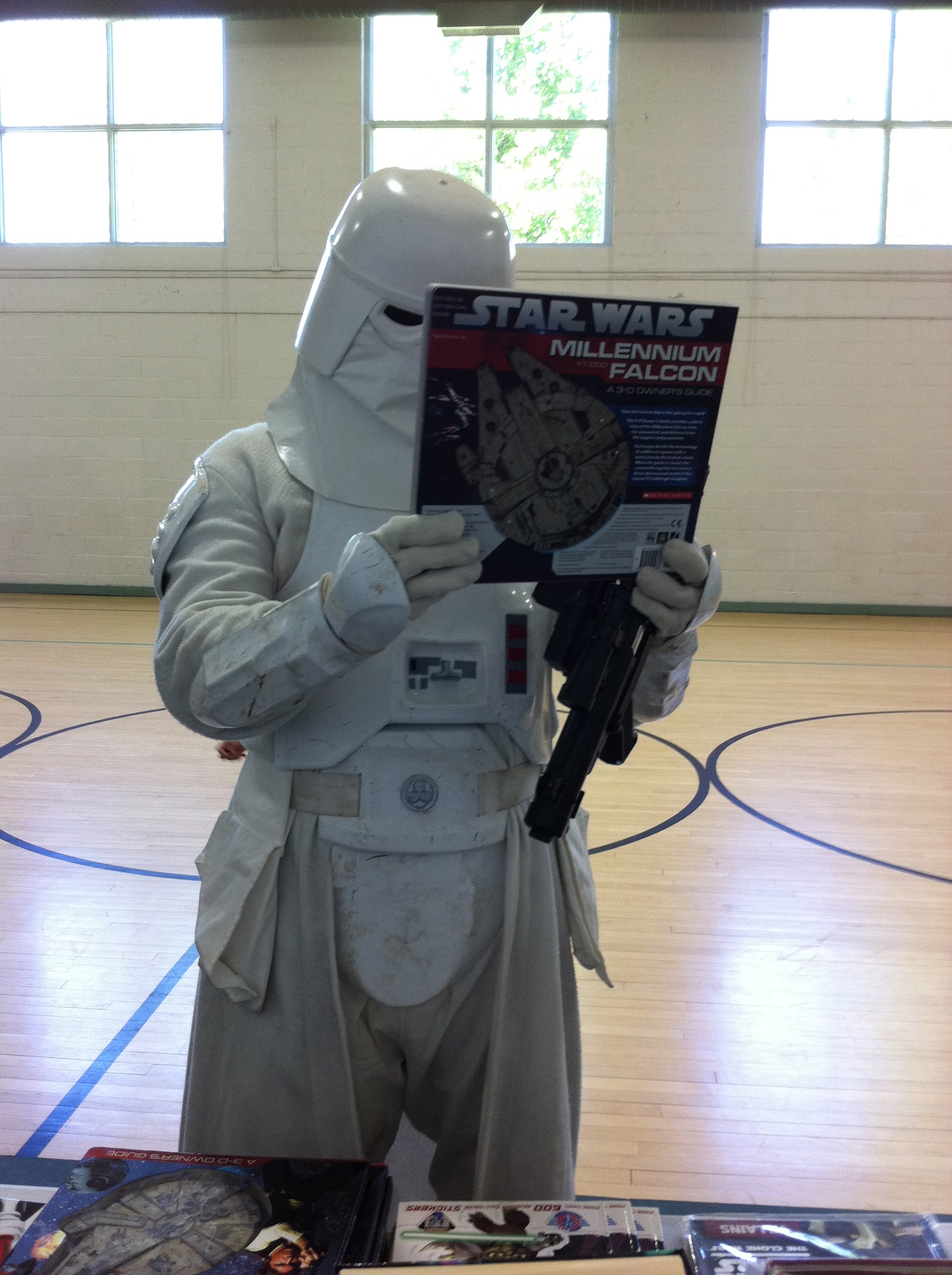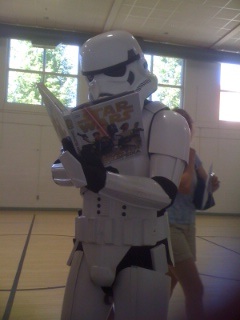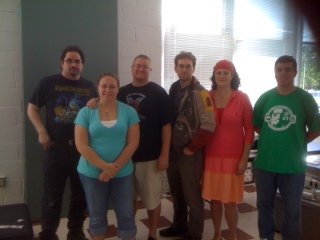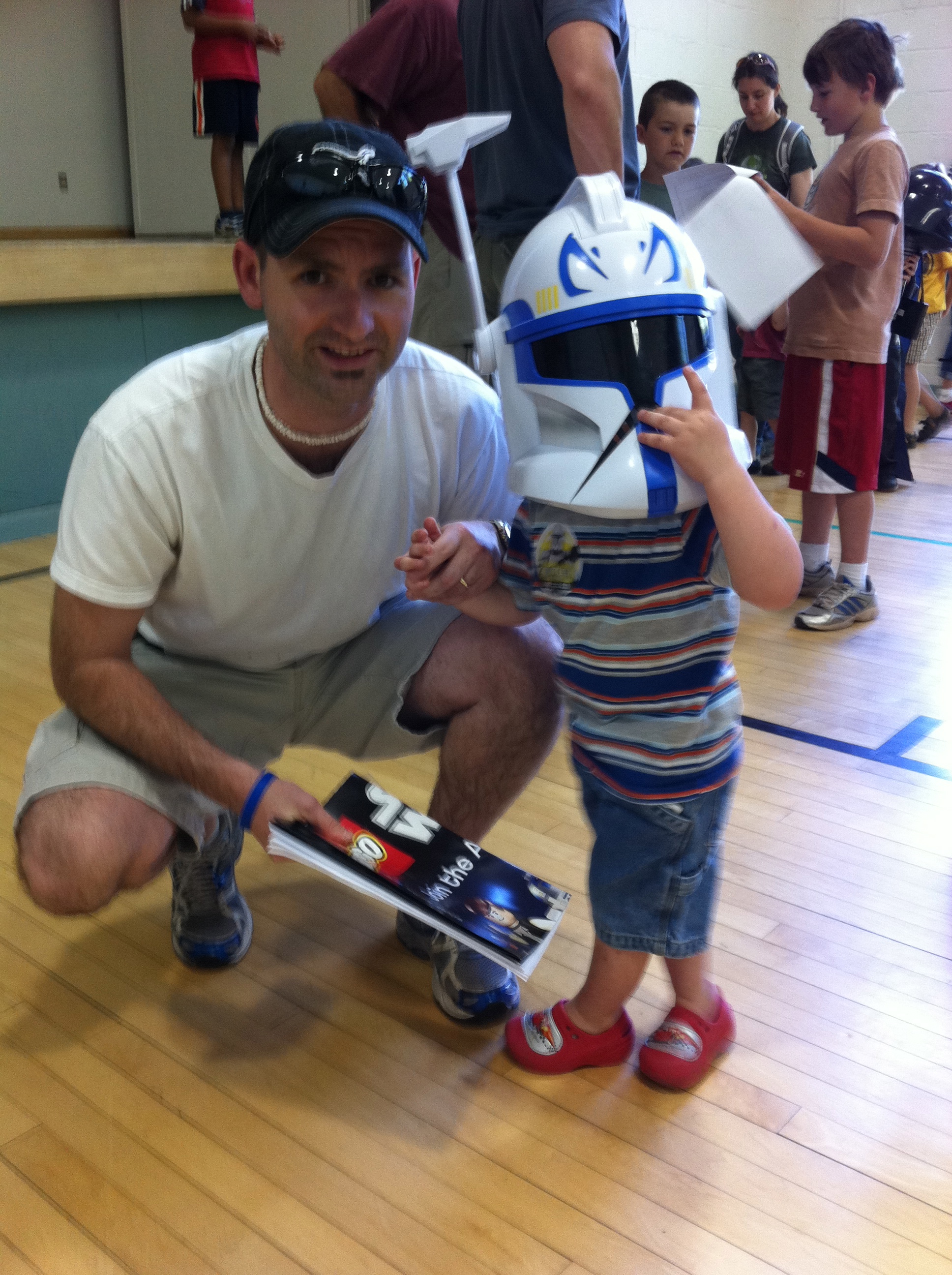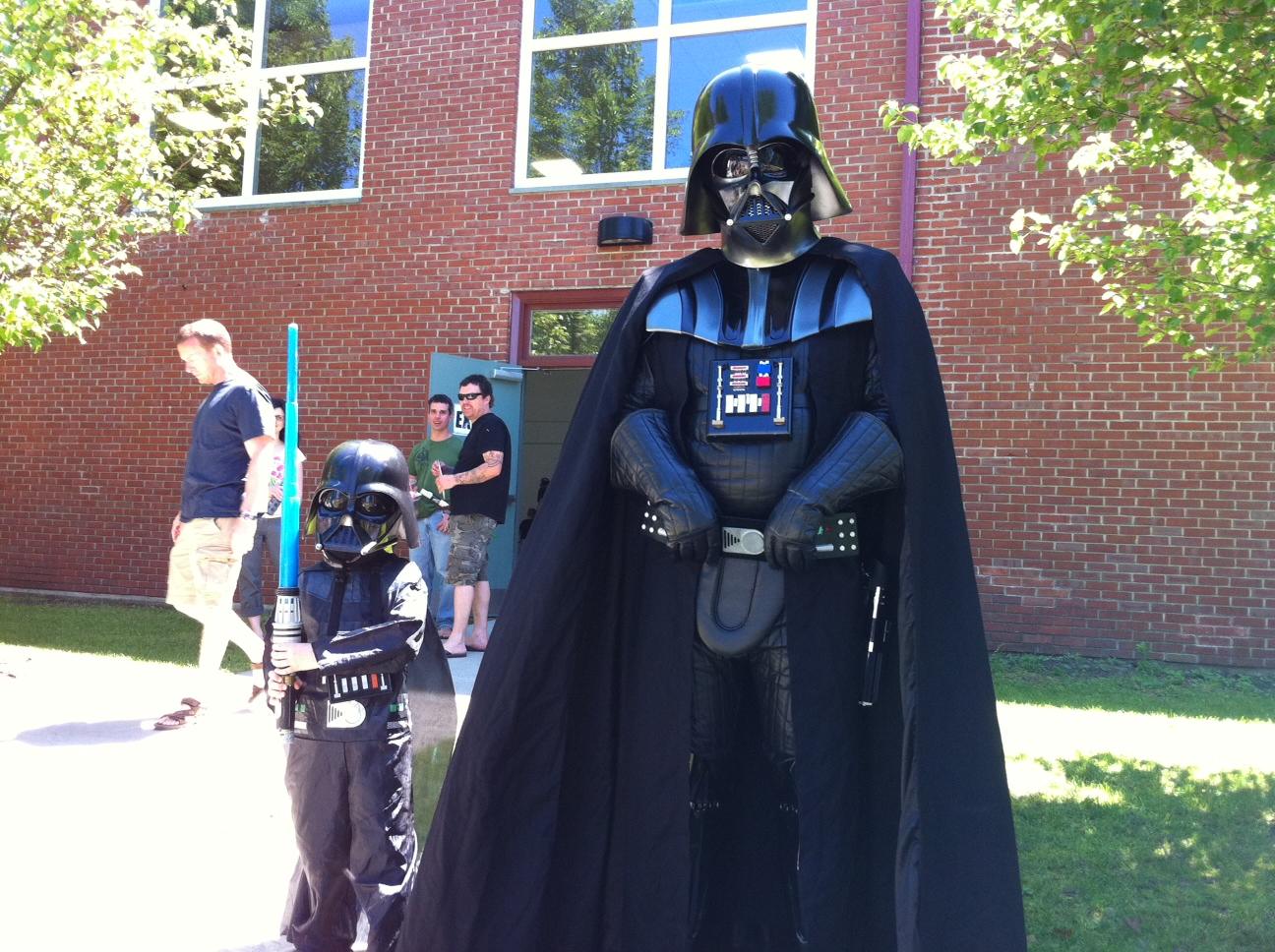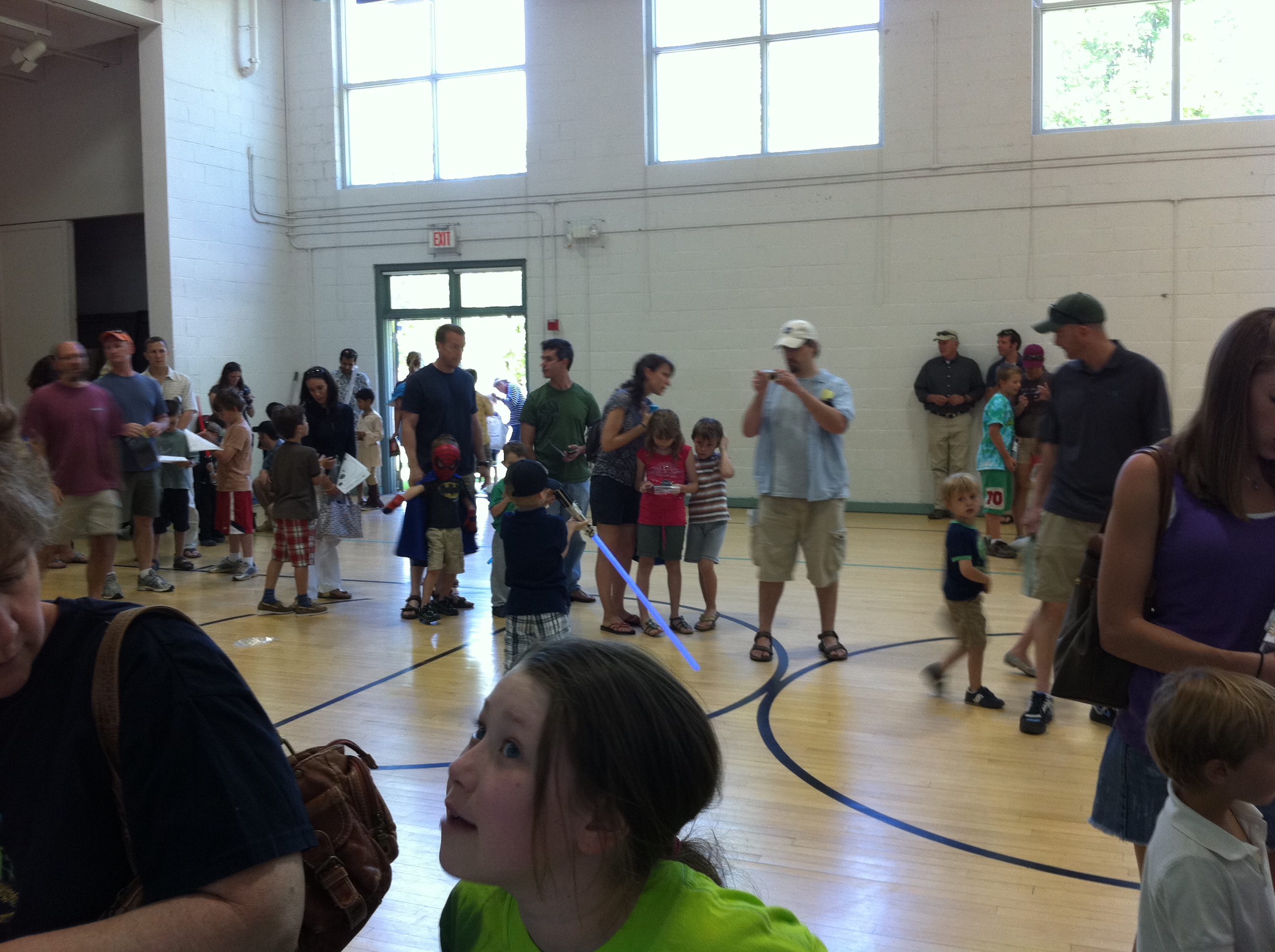It’s not every day when you open displays and they’re full of books your friend wrote. On Monday it was my very happy pleasure to  unbox several cartons of Middle School: The Worst Years of My Life, written by James Patterson (this is his first foray into middle-grade realistic fiction) and Chris Tebbetts.
unbox several cartons of Middle School: The Worst Years of My Life, written by James Patterson (this is his first foray into middle-grade realistic fiction) and Chris Tebbetts.
Chris has been a customer of ours since 2005 when he quickly became a friend. He and my partner, Elizabeth Bluemle, often run into to each other at various writing retreats. After talking about playing tennis for the past two years and not ever making it to a court, Chris and I finally began playing this year.
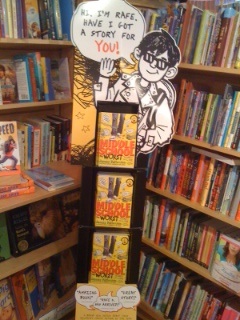 It’s a lovely thing when someone you know writes a book. Chris had already been a published author when we met him, but this feels like a BIG book. I put together the display dump with a smile on my face. I can say, that after 15 years of setting up displays I have never filled it with books co-authored by a friend.
It’s a lovely thing when someone you know writes a book. Chris had already been a published author when we met him, but this feels like a BIG book. I put together the display dump with a smile on my face. I can say, that after 15 years of setting up displays I have never filled it with books co-authored by a friend.
As soon as I was done with the display I was full of questions for Chris, so I sent him an email. The first question was really simple: How did you get hooked up with James Patterson?
He got my name from a book packager where I did a fantasy adventure series (The Viking) several years ago. He asked to see some sample chapters from me, and this project was the eventual result.
My second question was one that I’ve often wondered with co-authored books. Just how did the collaboration process work?
Jim wrote a detailed chapter by chapter outline of the book, along with some beginning chapters to establish the tone and the voice of the whole thing. I then took that outline and started drafting the rest of the story, in consultation with him each step of the way. Then, at the end of that process, he took the manuscript and wrote the whole thing to completion. Also, in this case, there was an illustrator, Laura Park, who created the visual world of the story once it was written.
And my final question was purely of self-interest, as I’ve sold half of my display already: will you two be writing another in the series?
Happily, yes! We’re right in the middle of working on Book Two in this Middle School series.
I guess the new deadline for book two is why we haven’t played tennis lately. As sad as I am for that, I’m thrilled for the success of the book, and for now I will content myself with keeping Chris in the dump.
Monthly Archives: June 2011
Honk for Humor
Elizabeth Bluemle - June 28, 2011
 Here at the Flying Pig, we’re suckers for good writing — and very appreciative of the talent required for good funny writing. When I was in the Vermont College MFA program in writing for children and young adults back in the early aughts, I noticed that a significant majority of awards and scholarships given to students tended to go to the tonally serious works of literary fiction. They were deserving and powerful pieces, to be sure, but my funny comrades’ novels, with words that may have trodden more lightly on the soul but enlivened and enriched their readers equally, were left in the dust. Why was this the case?
Here at the Flying Pig, we’re suckers for good writing — and very appreciative of the talent required for good funny writing. When I was in the Vermont College MFA program in writing for children and young adults back in the early aughts, I noticed that a significant majority of awards and scholarships given to students tended to go to the tonally serious works of literary fiction. They were deserving and powerful pieces, to be sure, but my funny comrades’ novels, with words that may have trodden more lightly on the soul but enlivened and enriched their readers equally, were left in the dust. Why was this the case?
It’s no secret that comic novels have had a tendency to be overlooked by big prize committees, in much the same way that Best Picture Academy Awards tend to favor the serious. I think humorous writing has gained more respect in recent years, and most of us understand how difficult it is to do really well. But I wonder if we adult readers and critics still tend to discount or distrust laughter-inducing writing as a literary achievement.
As a child reader, some of the books that spoke most deeply to me had a good deal of humor and/or comedy woven into their souls: Charlotte’s Web, The Trumpet of the Swan, Harriet the Spy, The Little Prince, Nobody’s Family Is Going to Change, A Girl Called Al, The Phantom Tollbooth, and so many more. Heck, even the seriously epic Lord of the Rings trilogy is leavened with comic relief and hearty humor. Deep messages may be delivered with a light touch.
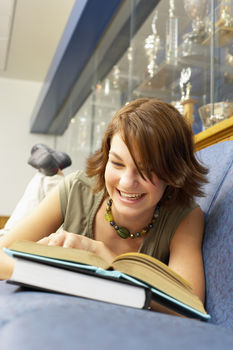 It occurred to me that I could do more than simply bemoan the lack of recognition for humorous works. So in 2004, we created the Flying Pig Grade-A, Number-One-Ham Humor Award, or FPGANOH-HA! (In case you’re curious, this acronym is pronounced EFF-pah-gah-no-HA! and is a great deal of fun to say with gusto. Try it.) The monetary prize — currently $735 — is given to the best submitted humorous piece in any genre by unpublished Vermont College MFA students in the Writing for Children and Young Adults program. For the first several years, we limited the competition to first- and second-semester students. There were few awards and scholarships open to them and we felt they would most benefit from early encouragement. But it’s a small student body, and for the last couple of years, we’ve opened to the entire student body. They must still be unpublished, however. Aspiring authors need as much reinforcement as they can get; those pre-publication waters are tricky to swim. (Post-publication waters are tricky, too, but in totally different ways. Ah, commerce. However, I digress.)
It occurred to me that I could do more than simply bemoan the lack of recognition for humorous works. So in 2004, we created the Flying Pig Grade-A, Number-One-Ham Humor Award, or FPGANOH-HA! (In case you’re curious, this acronym is pronounced EFF-pah-gah-no-HA! and is a great deal of fun to say with gusto. Try it.) The monetary prize — currently $735 — is given to the best submitted humorous piece in any genre by unpublished Vermont College MFA students in the Writing for Children and Young Adults program. For the first several years, we limited the competition to first- and second-semester students. There were few awards and scholarships open to them and we felt they would most benefit from early encouragement. But it’s a small student body, and for the last couple of years, we’ve opened to the entire student body. They must still be unpublished, however. Aspiring authors need as much reinforcement as they can get; those pre-publication waters are tricky to swim. (Post-publication waters are tricky, too, but in totally different ways. Ah, commerce. However, I digress.)
What this means for us is that every spring, Josie and I get a thick pile of anonymous manuscripts (or an email full of pdfs) to read, and it’s SO MUCH FUN to read and discuss them, and wrestle with the final decision. That is the situation we face at this very moment—with a particularly good set of submissions!—and the reason I am ending this blog post in a moment. We have a final decision to make. Wish us luck; it’s a toughie.
Do you think funny books are overlooked by award committees?
In praise of all books humorous and rich, I would like to invite you to share your favorite funny 2011 titles. Perhaps one of them was even written by a former FPGANOH-HA! winner.
Good Idea? Bad Idea?
Josie Leavitt - June 27, 2011
We’ve taken the plunge, with the help of Google eBooks, to begin selling e-books on our website. Is this a good idea, or a bad idea? Only time will tell. My naive self thinks it could be a win-win, but the cynic in me thinks it could be the beginning of the slow and painful death of brick and mortar stores.
The hopeful in me thinks that my customers who have e-readers will now buy their e-books from me. Thereby, shopping local for their e-readers. It needs to be stated that only customers without Kindles can buy e-books from me. Kindle owners will continue to frequent Amazon and that could have more of a negative effect on the stability of physical stores than anything else. (This is a discussion for another day.) I should say, a lot of my e-book reading customers continue to buy physical books. They split their book purchases half and half with their e-readers and the book. These are the customers I think we’ll get to buy e-books, and these are customers who up till today, haven’t been buying e-books from me. I can’t help but feel that being able to buy e-books from their trusted indie might garner more e-book sales than I think.
The cynic in me thinks too many people are now reading e-books, that a physical store might become unnecessary, and my selling the e-book is just contributing to my own demise. It’s a tricky situation. But to not offer e-books seems like I’m forcing customers to leave my store to buy their e-books.
No one knows what’s going to happen in a year, or five. I can’t imagine that bookstores will become obsolete. There are too many people who don’t have e-readers, or interest in them, that I think the need to hold a book will always remain. My fear is that the twenty somethings, who love their technology, will always want e-readers. And then there the kids who are growing up wired to everything and might not have the affection for the physical book as most adults who grew up with books do now. I wonder what four-year-olds, who might be playing with e-book apps, are going to feel about physical books when they have their own disposable income.
So, I’m standing on the precipice of a new bookselling age. I have been obsessively checking my website to see if I’ve sold any e-books. It’s only been four hours, and so far, I haven’t sold any.
There is for sure one up-side to customers being able to buy e-books from me: fewer awkward moments at the supermarket when a customer confesses that the reason they haven’t been into the store for a year is because they’re reading books on their iPad.
A Very Personal Event
Josie Leavitt - June 24, 2011
Wednesday night we had the pleasure of hosting Melissa Coleman, who presented her lovely memoir, This Life Is in Your Hands: One Dream, Sixty Acres and a Family Undone to a crowd of more than 50. 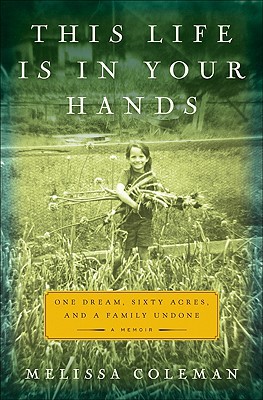 The book is wonderful, so I was confident we’d get a good turnout, despite the very heavy rain we had. What I didn’t expect was a truly personal event, with many people from Melissa’s past in attendance.
The book is wonderful, so I was confident we’d get a good turnout, despite the very heavy rain we had. What I didn’t expect was a truly personal event, with many people from Melissa’s past in attendance.
I’m not giving anything away to say that the tragedy in the book is the accidental drowning of Melissa’s younger sister, Heidi, when she was three. To have the author speak of her writing process as getting her little sister back, left few in the audience without a lump in their throats. I loved this book, having practically devoured it in one sitting, but to hear parts I found moving while reading, read aloud, was particularly moving.
Melissa is a good reader. Her honesty about not wanting to read some parts aloud “because they make me sad” was just so heartfelt. Melissa’s first draft, she said, was terrible. “Like a donut without a center. I needed to find the center.” So, she set out to fill in some of her childhood by seeking out the farm apprentices. 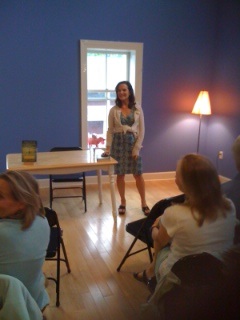 Melissa’s parents were followers of Tim and Helen Nearing, who had a 60-acre farm right next to theirs. To help them run their farms, both families had apprentices, “all of whom arrived in a VW and had found The Good Life by the
Melissa’s parents were followers of Tim and Helen Nearing, who had a 60-acre farm right next to theirs. To help them run their farms, both families had apprentices, “all of whom arrived in a VW and had found The Good Life by the 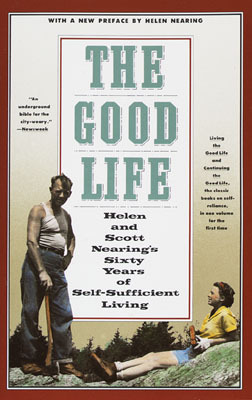 Nearings in a health food store,” to do farm work. What I was not expecting that five of them would be at the event. They shared stories of Melissa’s childhood, that she herself might not have known because she was too little when they happened. These folk had been there for a long time. It was like the book came to life, especially after Melissa read the passages that included the apprentices in the room.
Nearings in a health food store,” to do farm work. What I was not expecting that five of them would be at the event. They shared stories of Melissa’s childhood, that she herself might not have known because she was too little when they happened. These folk had been there for a long time. It was like the book came to life, especially after Melissa read the passages that included the apprentices in the room.
I just loved this event for that. Everyone was so naturally at ease telling these stories. And the signing line was leisurely as even more people wanted to share stories. Melissa also did something I’ve never seen an author do at the start of the Q&A portion: she asked us a question, “What brings you here tonight?” And that really set folks at ease and the conversation just started.
I think because the book deals with a horrible tragedy there was an emotional tone to the event to begin with. Melissa asked us to help illustrate a point by singing “Michael Row Your Boat Ashore” (a song sung on the farm with great regularity). Rather than having her read it aloud, this helped make a point in the book about the solstice and of life: the light always comes back around no matter what happens.
Paying for Events
Josie Leavitt - June 23, 2011
There has been a lot of discussion this week about the practice of asking customers to pay for events, starting with an article in the New York Times on Tuesday. It’s a very interesting question and reflects the changing nature of author events. Ultimately, events exist for several reasons: to support the author’s newest book, and his/her backlist, to sell books, and to allow fans to meet the author. There needs to be a balance among these variables at all times, and we need to understand that with different sales avenues, books may not be purchased at the store hosting the event. Bookstores need to make money on events, as they cost money to put on. We provide wine and cheese at all adult events and that’s not always reimbursed by the publishers.
Booksellers have been talking about how to give bookstore events more value, and thereby encouraging customers to buy event books at the store. One way of adding value to the events was charging for them. Amazon, for all its low prices, will never host events, so it’s very disheartening to see people come to events with books purchased there. People sometimes think “free” means “less important.” Therefore, charging for something, even a nominal fee, can imbue an event with more significance than a free one. Making someone buy a ticket for an event also ensures that ticket purchasers will be far more likely to come to the event. And more information the bookstore has about the number of tickets sold can really help them make informed event orders and return fewer books after the event.
We don’t charge for events, adult or children’s. I feel like it’s a slippery slope to start charging, but I’m torn. On the one hand, I’d love it if every attendee bought a book, but I feel like I can’t mandate that, unless it’s a huge author and we’ve rented a space to accommodate the crowd. On the other hand, I do think a $3 ticket seems reasonable, especially if the cost of the ticket can used for the book purchase. This feels like a small enough amount that most people can probably afford it, and not feel beholden to buy a hardcover.
I’ve heard some stores deal with the “bought the book somewhere else” conundrum buy assigning tickets for the signing line based on where folks bought the book. Buy the book at the store, you’re at the front of the signing line, bought it from Amazon or somewhere else, you’re at the back of the line. This feels punitive, but it does help reinforce that supporting your local store will be appreciated by the store, and you will be rewarded for it.
With children’s events there is always the question of how many books from home can someone bring into the event to be signed. Often, the author will have guidelines about how many books they’ll sign from home. Other times, it’s up to the store to set a policy. This is a touchy area. I don’t expect kids to understand the complexities of this, but parents should be mindful of the purpose of an event, and get the new book signed first and maybe one or two brought from home, and then get back in line if they want all the books from home signed. This is respectful to everyone and can keep everyone happy.
What are your thoughts on charging for events? Do you mind paying for events?
PS: We had an event last night with fifty people in attendance. Fully half of those folks do not regularly shop at the store. We sold about twenty eight books. I can say with confidence that if I had required a book purchase to attend the event, there’s no way we would have had so many people in the audience. The book in question was Melissa Coleman’s wonderful memoir, This Life is in Your Hands a book that speaks of farming and tragedy in a real way. Had I required some of the farmers who attended to buy the book, I might have had far fewer folks attending the event and as such the event would have lost a lot of its charm and real emotion. (I’ll blog more about this great event for Friday) I think the thing to remember is a great event is remembered by all who attend, and while they might not buy a book that night, they might well remember how that event made them feel the next time they need to buy a gift.
A Flying Pig First: Wedding in the Bookstore!
Elizabeth Bluemle - June 22, 2011
Nothing makes us feel better about our bricks-and-mortar bookstore than when it serves as a unique and meaningful place to friends, family, customers and community members. At the Flying Pig, we’ve been privileged to witness a baby taking his first steps. We’ve been honored (if slightly disconcerted) to hear that a ten-year-old customer—in a family discussion about burial and cremation and other post-life possibilities—expressed her wish to someday be buried under the bookstore: her ideal resting place. Now, after this weekend, we can also claim the immense delight of having hosted a wedding—in the Classics and Poetry section, no less.
A few months ago, I received a call from a friend and former Vermont College MFA classmate, whom we’ll refer to as Gabrielle for the purposes of this post.
Gabrielle told me she and her boyfriend were going to elope in June, and that they really wanted to be married at The Flying Pig. It was a wild and wonderful idea, and perfectly suited to them. She’s a children’s book writer and PR professional; he’s a published art historian. They share a deep love of books and literature, and, although they don’t live in Vermont, they both have connections to the state and great memories here. It was a match, as they say, made in heaven.
We put Gabrielle and Doogle* in touch with our dear friend, hereafter referred to as The Good Judge, who was to perform the ceremony. (*Doogle is Gabrielle’s nickname for her guy, because he is such a font of knowledge that she never needs to search Google any more, and his name starts with a D.) Because this was a top-secret elopement, we successfully resisted the urge to tell everyone we knew to casually drop by the bookstore at 6:00 pm on July 18.
The ceremony was beautiful and intimate and fun — just the five of us. The vows were both classic and contemporary, a template The Good Judge has developed over years of performing wedding services. And the bride and groom were gorgeous: he, rakish and charming; she, beautiful and graceful as Audrey Hepburn. (She was always the stylish one in our Vermont College class. Clearly, no one ever bothered to tell her that most of us children’s book writers prioritize comfort over fashion. Now, before I get flamed, please note that I did say “most.”)
The bride carried lilies; the groom wore a purple tie. Have I mentioned that it was just perfect?
Afterward, we had a champagne toast, then went to dinner at the glorious Inn at Shelburne Farms, and celebrated and laughed and teased and laughed some more, late into the evening. There was a glow around everything that afternoon and night, a glow that will last far into the future of our little bookstore. We wish Gabrielle and Doogle (can’t say that name without chuckling) a rich, light-filled life together and all manner of beautiful—and bookish—delights. We are so honored to have hosted their wedding, and if they ever run into a rocky patch, well, they know where they can find some helpful reading. Heck, we’re related now.
Star Wars in Shelburne
Josie Leavitt - June 20, 2011
Father’s Day was celebrated with an out-of-this world party at the Flying Pig with six Star Wars characters from the celebrated 501st Legion, a national organization that volunteers authentic role players to groups who fundraise for worthy causes.
A truly gorgeous day saw almost 200 people come to the Shelburne Town Gym (we wisely decided to hold this event offsite) to meet two Storm Troopers, a Biker Scout, a Snow Trooper, a Clone Trooper, and Darth Vader (complete with movie-authentic breathing; eek!).
Many of the children were in costume. Some kids were ready to meet their heroes without fear, while for others, bravado quickly turned to hiding behind daddy’s leg when the full-sized characters arrived. Little Darth Vaders came in several sizes.
The members of the 501st dress in authentic Star Wars uniforms, to the delight of hordes of fans both young and grown up. They appear at movie premieres, TV news and entertainment shows, and for groups looking to do a little celebrating for a good cause. Our event was a literacy fund raiser for the Stern Center for Language and Learning in Burlington, VT.
While the kids waited for the characters to sweep magnificently into the gym, they did mazes and word searches and other fun activities from DK’s great event kit. We held trivia quizzes and gave out prizes (also from DK’s kit), including keychains, stickers, pins, posters, and magnets. Needless to say, the children were ecstatic with their prizes.
Apparently, all the Troopers are readers, as well. Darth Vader was a careful shopper as were the other Troopers. Seeing the characters read was giggle-inducing every time. Later, they told us they love emphasizing reading to kids, and try to do that at every event where books are present.
How can we indie booksellers not love seeing movie characters avidly reading books?
The 501st Regiment did a wonderful job and the event was a smashing success.
Here they are after the event looking a little tired, but happy. Andrew Liptak, fourth from left, was our coordinator. He helped us book the event and did his best to get more members of the New England Garrison to come with him to the Flying Pig. These folks never got out of costume once during the two hours. They worked hard, were friendly and fun with the kids (and the adults), and had a great time. We couldn’t have been more thrilled, and we can’t recommend the 501st highly enough.
(Note: Josie wrote this post, and then Elizabeth added some pictures and text. So if this sounds like both of us, that’s why. If you don’t like something here, blame it on the other one. Thanks.)
The Games We (Don’t) Play: How Authors Stay Offline
Elizabeth Bluemle - June 17, 2011
If you’re reading this, you’re online — and quite possibly procrastinating. No judgment here; I’m the Internet version of the If You Give a Mouse a Cookie mouse, roaming from one tidbit to the next, from email to Google Maps to Google Earth to some new article about a space discovery to an audio clip of sounds from the stratosphere to the new David Cook single to—whoops, have I said too much?
Writers are particularly susceptible to the temptations of the Internet, since so many of us work on our laptops and do research online. What might start off as perfectly productive research session can quickly morph into “just a few minutes” on Facebook, YouTube, or any number of blogs, articles, or fun opportunities to noodle around creatively. I discovered a program called Freedom, which allows one to block access to the Internet for whatever amount of time you specify. The only problem is that there’s an easy workaround: a simple reboot. Still, it’s like any simple lock: it keeps honest people honest. As long as you really WANT to stay offline, Freedom might be just enough of a deterrent to keep you working.
At a recent writing retreat, I polled a group of authors about their tactics for keeping themselves away from the Internet when it’s time to work. Their responses were so varied that I opened the question to more children’s book authors and artists. Here, for your entertainment and enlightenment, are their get-down-to-work strategies:
Paul Acampora (Rachel Spinelli Punched Me in the Face, Roaring Brook, August 2011)
My dollar store composition notebook, a pack of post-it notes and a pocketful of cheap pens generally keep me Internet-free and productive during my writing time. If I could get the notebook to sync with my Dropbox account, it would be perfect!
Franny Billingsley (Chime, Dial)
[Elizabeth’s note: I have misplaced the slip of paper where I noted my breakfast companions’ responses, but I do remember this one because it is so self-disciplined!] Franny is soon moving to an apartment WITHOUT INTERNET. Enough said.
Cinda Chima (The Gray Wolf Throne, Hyperion, August 2011)
I have several strategies:
1. I put off online stuff until afternoon, after I have several hours of writing completed. There just aren’t that many writing/promotion emergencies that can’t wait a few hours. I mean, this isn’t the urgent-care helpline. If I get online first thing, the morning is shot.
2. I move to a different place to write. I used to go to a cafe that didn’t have Internet access, but now they almost all do. Still, there’s something about relocating that tells me, You’re at work, now! You can’t be getting online.
3. Most of my online stuff is writing-related, and that can be more dangerous than playing games, etc, because you can tell yourself you’re working. I set daily word goals, and my online posts/comments DON’T count.
4. I try to resist jumping online to research something in the midst of a writing session–say, brands of electric guitars. I just use a place-holder and move on. For example, NAME OF GUITAR, knowing I can go back and research that later.
Now I better get offline and back to revisions.
Sue Corbett (The Last Newspaper Boy in America, Puffin)
Signing off FB right now. Thanks for the nudge.
Karen Day (A Million Miles from Boston, Wendy Lamb Books/Random House)
When I’m trying to write and avoid the Internet, I play games with myself. I must not look at the Internet for 15 minutes! Or 20 minutes! And then I reward myself by checking Facebook and/or e-mail. I do the same thing to avoid eating!! Just 20 more minutes and then I can raid the refrigerator. I also get up early to write (5:30). I am the least distracted at this time of the day. I also know that it’s so early that I haven’t missed much online!
Elizabeth O. Dulemba (Soap, Soap, Soap / Jabon, Jabon, Jabon, Raven Tree)
What? What? Did you say something? Can’t talk… too busy working… : )
Michelle Edwards (A Knitter’s Home Companion, Stewart, Tabori, & Chang)
I have two computers in my studio. I write on my laptop with Internet button off and my back to my desktop’s screen. I never write with music on, and usually I wear earplugs. Someday, I try to stay off entirely, then there’s always a sweet calmness that sets in midday–an oasis of calm.
Gail Gauthier (A Girl, a Boy, and Three Robbers, Putnam)
We have a laptop in our bedroom, and I sometimes take a flash drive with a WIP on it up there because we don’t have Internet access in our bedroom. Unfortunately, there are some games on that laptop. And our son set us up with wireless access, bless his heart, so now that laptop can access the Internet. Right now I don’t know how to do it, so I still have that. But I don’t know how long that will last.
Deborah Heiligman (Fun Dog, Sun Dog, Marshall Cavendish)
hysterical laughter.
……..
I thought I was going to give you a great and reasoned response… but I imagine others have. Can’t wait to read the article and get some tips…
Marcia Thornton Jones (Ratfink, Dutton)
I schedule online distractions throughout the day (before starting work; mid-session break; lunch; post-lunch mid-session break; after work break). I’m not always perfect, but by logging off and closing search tabs I can more easily focus on forward writing progress.
On the other hand, I’ve found that when my writing is stalled, online distractions actually offer a much-needed break. While my conscious mind surfs, my subconscious mulls over whatever has me blocked.
On days when I’m not really blocked, but I’m just feeling lazy and undisciplined, I set small goals with online time as a reward.
And when all else fails…I nap!
JD Lester (Grandma Calls Me Gigglepie, Robin Corey Books/Random House)
how do i keep myself off the Internet? like anyone else, i suppose. duct tape, gorilla glue, booby traps and the like. none of it works, though.
Sarah Darer Littman (Want to Go Private? Scholastic, August 2011)
I make sure to turn off my Twitter and Email client programs. Also, I make a highlighted (INSERT GOOGLEABLE THING HERE) note and scribble (hopefully legibly) on a notepad a list of things I need to look up on the Internet later instead of stopping to start research that one particular small thing, which will prove so incredibly fascinating that I have to go to the next web page to research some more and then the next and *SQUIRREL!!!*
Kate Messner (Marty McGuire, Scholastic)
We build a “writing room” in the back of the house last summer. You can’t get to it without stepping outside first, which was intentional. And…it has no wireless. Which wasn’t intentional but is really kind of wonderful. When I’m writing and think “Oh, I’ll just pop online and look up one quick detail…” I have to decide if I really need to check right that second, which means going back into the main house and upstairs…or if I could make a note, keep writing, and check later. I’m sure it saves me lots of time – because who ever really checks “just that one thing” without then drifting into email and Twitter and whatnot? I end up writing without interruption during my writing time and then looking things up all at once later on.
Wendie Old (The Halloween Book of Facts and Fun, Albert Whitman)
I move to a different spot for serious writing.
Upstairs is my desktop computer which I use for everything — writing, email, Internet, games, whathaveyou.
I have a comfy chair in the living room with a small table in front of it where the laptop is stationed. It’s my alternate office. My laptop computer is for writing. There I do no email, the Internet is for research only, and I write. Until my body rebels and I have to change position, again (get a snack, pay bills, do something else and not write). The living room also holds my husband’s desk and computer and my granddaughter’s desk and computer. The family that computes together….)
I bounce between the two computers. The change of scene (from my office to the living room) also prevents me from getting bored with the writing project that I HAVE TO get done. All my work is in Dropbox, so the only thing I have to remember to do is to close what I’m working on before I move to the other computer.
Traveling is a whole ‘nother ball game….
Cynthia Jaynes-Omololu (Dirty Little Secrets, Walker/Bloomsbury)
Word count. It’s a numbers game. I tell myself that if I finish 1,000 new words then I get to mess around on the Internet for half an hour. If I don’t put any limits on myself, I can waste an entire day refreshing email, Tweeting, Facebooking, Stat Countering, on the Verla Kay Blueboards and then starting all over again in a punishing loop.
Ammi-Joan Paquette (Nowhere Girl, Walker, September 2011)
I know that Internet distractions aren’t something I can cut out altogether, but it’s also a habit that can very easily grow out of control. Early on, I made some decisions about which sites or hotspots were most important to me to keep up on—whether for personal or work-related reasons—and which ones were less relevant. I then saved my essential two or three sites into shortcuts (by dragging the link onto my toolbar), so they’re easily accessed with one click. The others are all stored deep in subfolders of my Favorites menu. This makes it easy to keep up with the sites that are truly important to me, giving me that sense of connectedness that I need, while stowing the others out of everyday use, for days when I have longer to spend or want to reward myself with some heavy-duty web immersion.
Rosanne Parry (Second Fiddle, Random House)
The benefit to living on the west coast is that if my editor or agent has something they want from me, it’s in my inbox by 7am. So first thing in the morning is my time to deal with email–an added bonus, my teenagers are happy to have me distracted and not mothering them on the way out the door in the morning.
Once the email is done I just turn the airport off while I work. If my kid’s teachers have something I need to see, they’ve usually gotten in touch by noon, so I take a look at email again while I eat lunch. If I’ve found a detail I need to research in the morning writing I’ll leave the airport on in the afternoon to look up what I need.
Once my kids are home from school, I’m busy taking them from place to place and often waiting in a room with no Internet, so it’s back to distraction free writing in the late afternoon. If I’ve had a productive writing day (and sometimes even if I haven’t) I indulge in blog reading in the evening. That’s also when I update my website, add to my Goodreads page, and write posts for the Mixed Up Files of Middle Grade Authors blog.
Leda Schubert (Reading to Peanut, Holiday House, August 2011)
1. I play no games at all, ever. Not even solitaire.
2. I limit Facebook time to 10 minutes a day, and I don’t allow any of those whatever-they-ares that require you to release info (apps? I have no idea). I de-activated the chat feature as well. (And I remind myself that I don’t want corporations to own any more of me.)
3. I don’t have a cell phone. The main reason is we don’t get reception, but it helps not to have one at all, anywhere.
4. Our connection, even though it’s broadband, is so slow that I can’t watch Youtube unless I have infinite patience, which I don’t.
5. I constantly remind myself of what’s really important to me. On my deathbed, will I be happy that I spent so much time online? Doubtful. Seriously doubtful.
6. Still, I do a lot of research for this and that. I’m not pure and good. If I’m really writing hard, I disconnect, which I can do with one click (and no program necessary).
Curious to hear what others do! We all need help.
Janni Lee Simner (Faerie Winter, Random House)
I’ve never found any way to keep myself offline except by brute force. I’ve downloaded various programs to block Internet access for a set length of time, but I’m just enough of a geek that within a few hours I figure out how to circumvent them. Better to forgo that distracting intellectual challenge and simply to force myself to hit the “off” switch on my wifi–ideally early in the day, before I even have a chance to start web surfing.
Jennifer J. Stewart (The Twelve Days of Christmas in Arizona, illustrated by Lynne Avril, Sterling)
A mother lode of guilt is working for me. No one thousand words equals no email/Internet. Not signing on until later in the day means I focus better on what I’m writing.
Pamela C. Swallow (Groundhog Gets a Say, Putnam and Puffin)
I have a few strategies to keep myself on task and off the Internet:
1) I set a minute timer for 45 or 60 minutes and promise myself to keep my seat in my seat until the bell goes off. No Internet allowed during that time.
2) I unwrap a Tootsie Pop and swear to myself that I will stay in my chair working on my manuscript until the Tootsie Pop is finished — the rule is that I may not bite into it–only lick until the very end. This can take approximately 30 minutes.
3) I use a laptop to work on my books. I do not connect it to the Internet. In order to look at the Internet or get email, I have to go to a different computer.
Chris Tebbetts (Middle School, The Worst Years of My Life, with James Patterson; illustrated by Laura Park, Little, Brown)
Having tried your own suggestion — Freedom software — and finding it too easy to foil (with a simple re-boot of the computer), I now send my ethernet cable off to work with my husband on most days. It’s both highly effective, and a kind of sad commentary on my own lack of will power, Internet-wise. The interesting side effect, though, is that when I get the cable back at the end of the day, I find my usual “need” for surfing the net and checking email is much less pronounced than it might be during my workday. In any case, I’ve found that my best bet is to completely remove the temptation from the house.
Deborah Underwood (The Loud Book, Houghton Mifflin)
I sometimes resort to Freedom, which disconnects you from the Internet for a given period of time. (You can get around it, but only if you reboot your computer.) Or I look for a cafe without wireless. I wish I were strong enough to stay offline on my own; alas!
Carrie G. Watson (Quad, Razorbill/Penguin)
Loved this question you posed on FB about how authors bribe themselves to stay off the Internet. Does that really happen? Jeez, when I’m writing I actually have to be bribed to get up and do things like laundry and, y’know, go to work. I do check my email and FB once in a while as I’m writing, but my writing time seems to correspond to when most of my peeps are working, so FB is usually pretty quiet and not a distraction. Does this make me an anomaly? Do most of your writer-peeps have to make secret, backroom deals with themselves to get off of FB and outline that plot? I had no idea this was going on!
Elizabeth Winthrop (Counting on Grace, Random House)
I have two desks. At one, I do all business work, at the other creative work. As long as I start the morning (often before breakfast), at the creative desk and stick to my rule of no email or web on writing mornings, then the writing happens…I can have coffee, chocolate, I’m allowed to knit while I stare at the screen, I can walk around, I can eat, I can even answer my landline (which rarely rings anymore) but I MAY not check email or troll the web. The book I’m working on requires research (they all do, even the picture books) so on those mornings I make an old-fashioned list with a pen and paper and do that research later, once the writing is done. I’ve found I can last about 2 and 1/2 hours before I cave in. The Internet has become for many people, myself included, not just a distraction, but an addiction.
Anne Ylvisaker (The Luck of the Buttons, Candlewick)
This is a great subject. I can’t wait to get tips from others. The Internet is such a time sapper. My last resort measure (when I’m really self-discipline-impaired) is go to my auto-office: I drive to the parking lot at the ocean, where there is no chance of picking up a wireless signal, and work on my laptop in my car with the windows down.
Jane Yolen (The Day Tiger Rose Said Goodbye, illustrated by Jim LaMarche, Random House)
I use the Internet, FB, Boggle as the carrot. Write another chapter and you can play–that’s my sort of thing.
What I Learned from Publicists
Josie Leavitt - June 16, 2011
Yesterday the New England Children’s Bookselling Advisory Council had a wonderful educational session about how best to work with publicists. What made this session so informative were the three publicists who came to Storrs, Conn., to share what they look for when selecting stores for stops on author tours. Many New England stores, especially those of north of Boston, sometimes feel that authors don’t come our way because of travel time, but I learned yesterday that there are many factors that go into designing a tour.
We were joined by Lara Phan who does account marketing for Random House; Marisa Russell, who does publicity for HarperCollins; and Elyse Marshall, associate director of publicity at Penguin. The panel was moderated by Suzanna Hermans who began the session by asking what publishers like to see in an event proposal. Most publishers use event grids as a way for all stores to request touring authors. The grid is a massive Excel spreadsheet that needs to be filled out in with lots of in-depth detail about what you can do for the event: how many books will you order, what size crowd do you expect, what is your marketing plan for the event, etc. Generally, booksellers do not like the grids, but after hearing from the panelists, I understand better why they’re good for the publishers: it allows them to compare apples to apples, not different emails written different ways about how a store will handle an event. Honestly, the grids can only help us. And one very exciting innovation that Random House is spearheading is the use of Edelweiss as a way to request authors. This had the room fairly abuzz, as it can literally save hours of work.
The publicists all stressed a lot of the same things, and I’ve made a list of them:
– The number one thing is enthusiasm for the author. All three women said that excitement about the author and a love of that person’s work will go far to distinguish one proposal from another.
– Cross-promotion: who can you work with to make your event richer than just a reading and a Q&A? Can you work with the knitting store down the street? Are you going to bring to people to the signing who might not otherwise come to a bookstore?
– Can you make your event special? Will you rent a costume to make the event seem more fun? All of these things are important to making your event stand out from the hundred or so requests the publisher gets for each author on tour. With so many stores competing for the very limited number of events, the more your store can do to really make an event sound fresh, energetic and fun can really only help your store’s chances of getting some authors.
– Share with the publishers a map of your area. Google Maps lets you create a map that you save as a link and include in all your emails. No one knows your state better than you, and it’s in your best interest to let the publicists know how many other stores an author can visit while in your area.
– Suzanna shared with us her remarkable Author Event Confirmation letter, which all the publicists said they LOVED. What they loved about it was the thoroughness of it. Suzanna went beyond confirming date and time, she included media contacts with their addresses for review copies, a very nicely worded paragraph suggesting that visiting authors include a link to the store or to add Indiebound.com to their author page. This is brilliant. It’s a nice way of reminding authors to support indies on their websites.
– Try to get media attention for all your events. All the publicists said their dream media attention was morning TV, a large newspaper article, and then a radio interview. Several of us just started laughing as we don’t have local morning news programs. So, helping the publishers get the media that exists in your market is really important. Have a good media list. Smaller markets often have lots of little newspapers and it’s hard for an outsider to know which one is the most effective, and any good info is always welcome.
– Give the publicity team as much info up front as possible so they don’t have to hunt for it. Just like we like a complete press pack for all events, it works the same way for the publishers. Know where an author can stay and what those places generally cost.
– Remember that the event guidelines often come from the authors themselves. There’s a reason we’re told where to put the post-its with the name of the person the book is being signed to. If the post-it is where the author looks, the signing line will go faster and more smoothly. Guidelines exist for a reason; adhere to them and things will go well.
Each house has a different view of author tours. Random House is only touring five authors nationally, Lara said Random House wants bigger events rather than smaller regional tours. While they only tour five authors, those five authors go more places and have a longer tour than other houses. Both Harper and Penguin have 20 national tours this fall. All the women spoke of “author care” as a major component of their jobs. Honestly, I’d never thought of this, but it makes sense. Authors need tending, especially when they’re on tour for weeks. Personal preferences for airlines, number of connections they’re willing to make to get from A to B (there are authors who refuse to make connections, thereby they’ve pretty much eliminating much of New England and many smaller markets) and a host of other personal preferences can make planning a tour very complicated.
Lara, Marisa, and Elyse all said that there is a fine balance between book sales, author happiness, store happiness, event quality and media coverage. All stated that it’s not always the 500-person event that touches an author. Elyse said it best: they are looking to create moments. Sometimes, great events are with 20 people who love the author. Obviously, a 20-person event is a disappointment, but it can also be a really meaningful event that will have a sell-through of signed books that lasts months beyond the event. But secretly we all want to have the “knock your socks off, hundreds of people attending” events.
The last thing I took away from this was to follow-up after events. I’m usually so happy that the event is behind me that I never remember to send an email about the event. All the panelists agreed that this was what they craved: a simple email that states how many people attended, number of books sold, and Elyse suggested writing up a “moment” from the event that was particularly moving. Also, they all said if we had a photo or two to send along, that would be great as well.
So, while I wait to hear about the many author requests I’ve made for the fall, so for I’ve only gotten one confirmed (which I’m thrilled about) I will be patient and follow up in three weeks and I’ll remember not to take it personally when an author can’t make it, this time. And honestly, I’d much rather be hosting events than planning them because that seems far harder and you don’t get the joy of the event, instead their work doesn’t stop until the author is home from the tour.
Boston Globe-Horn Book Awards Reaction
Elizabeth Bluemle - June 15, 2011
I love the Boston Globe-Horn Book Awards. They always reward enduring literary quality, and, because of their unusual, off-cycle consideration schedule (books published between June of the preceding year and May of the current year), they often “catch” gems that went unrewarded during the big January announcements. I was eternally grateful, for example, for their recognition of the superb Amber Was Brave, Essie Was Smart by Vera B. Williams, in 2002.
This year’s selections add up to a sumptuous feast for readers and art lovers! Here’s the list, along with a few of my own thoughts about the ones I’ve read.
FICTION
 Winner: Blink & Caution by Tim Wynne-Jones (Candlewick) Joy! Heraldry! I love this book, and blogged about it and its author a while back here. Not only is this young-adult novel imaginative, with memorable characters and strong voices, but it’s structurally complex and accomplished. One of his all-time bests, in a career full of bests.
Winner: Blink & Caution by Tim Wynne-Jones (Candlewick) Joy! Heraldry! I love this book, and blogged about it and its author a while back here. Not only is this young-adult novel imaginative, with memorable characters and strong voices, but it’s structurally complex and accomplished. One of his all-time bests, in a career full of bests.
Honor: Chime by Franny Billingsley (Dial) O frabjous day! Caloo, calay! she chortled in her joy. I love THIS book, too, and blogged about it here. The language alone — its gorgeousness and evocative quality, its beautifully controlled lushness — reminds me what writing and storytelling can be, even (and especially) for young people.
Honor: Anna Hibiscus by Atinuke (Kane Miller) How did I miss this one?! I haven’t read it yet, but am going to knock over folks to get to it now. Anna Hibiscus received a starred review from Kirkus, and is part of a series of chapter books about a young girl in Nigeria, all of which look exceptionally charming. And if the BG-HB Awards say it is, then it is!
NONFICTION
 Winner: The Notorious Benedict Arnold: A True Story of Adventure, Heroism, & Treachery by Steve Sheinkin (Flash Point/Roaring Brook) I had the great good pleasure of sitting with Steve Sheinkin on a panel last year, and was immediately impressed by his lively command of history, sense of humor, and ability to make the past seem like the freshest kind of adventure treat for kids to dig their teeth into. That is no small feat, and I’m glad Sheinkin’s excellent writing has been noticed and rewarded. I loved this book and his earlier works, too. (Teachers and librarians take note: this is a guy you want talking to kids about history. Book him if you can!)
Winner: The Notorious Benedict Arnold: A True Story of Adventure, Heroism, & Treachery by Steve Sheinkin (Flash Point/Roaring Brook) I had the great good pleasure of sitting with Steve Sheinkin on a panel last year, and was immediately impressed by his lively command of history, sense of humor, and ability to make the past seem like the freshest kind of adventure treat for kids to dig their teeth into. That is no small feat, and I’m glad Sheinkin’s excellent writing has been noticed and rewarded. I loved this book and his earlier works, too. (Teachers and librarians take note: this is a guy you want talking to kids about history. Book him if you can!)
Honor: Into the Unknown: How Great Explorers Found Their Way by Land, Sea, and Air by Stewart Ross, illustrated by Stephen Biesty (Candlewick) This is one of those addictive books kids pore over. Biesty’s mesmerizing, detailed cross-sections illustrate a wide variety of great voyages throughout history (in addition to the more traditional latitudinal explorations of land and sea are some vertical ascents and descents: Tenzing Norgay and Edmind Hillary’s historic summit of Everest, Neil Armstrong and Buzz Aldrin’s trip to the moon, Jacques Piccard’s undersea voyage to the Marianas Trench).
Honor: Can We Save the Tiger? by Martin Jenkins, illustrated by Vicky White (Candlewick) I haven’t read this yet, but it looks quite handsome and worthy, received four starred reviews (PW, HB, Kirkus, and SLJ), and is billed as providing hope along with the realities of endangered species. AND, it’s by the author/illustrator team behind Ape, which I loved.
PICTURE BOOKS:
 Winner: Pocketful of Posies: A Treasury of Nursery Rhymes by Salley Mavor (Houghton) This is an extraordinary artistic achievement by fabric artist Salley Mavor. Carol B. Chittenden of Eight Cousins alerted fellow booksellers to this one, and during the New England Children’s Booksellers Association’s “Best of the Best” roundup last fall, added this: “Pocketful of Posies…is so beautiful, so perfect for ages 0-4…. What a good feeling it is to offer customers something of obvious value far beyond its cover price.” She also mentioned that one of the big chains didn’t pick it up — another example of indie booksellers discovering and championing true gems!
Winner: Pocketful of Posies: A Treasury of Nursery Rhymes by Salley Mavor (Houghton) This is an extraordinary artistic achievement by fabric artist Salley Mavor. Carol B. Chittenden of Eight Cousins alerted fellow booksellers to this one, and during the New England Children’s Booksellers Association’s “Best of the Best” roundup last fall, added this: “Pocketful of Posies…is so beautiful, so perfect for ages 0-4…. What a good feeling it is to offer customers something of obvious value far beyond its cover price.” She also mentioned that one of the big chains didn’t pick it up — another example of indie booksellers discovering and championing true gems!
Honor: Dark Emperor and Other Poems of the Night by Joyce Sidman, illustrated by Rick Allen (Houghton) I’m a sucker for Sidman’s clear, lyrical poetry, which is here beautifully matched by Allen’s prints, done in a twilight and nighttime palette. Not a single teacher (or poetry-loving parent) I’ve shown this to has passed it up. A beautiful, useful book.
Honor: Pecan Pie Baby by Jacqueline Woodson, illustrated by Sophie Blackall (Putnam) Jacqueline Woodson sure can write, and Sophie Blackall sure can draw irresistible characters! This story about an older sibling reacting to a new baby — “I’m so sick of that ding-dang baby!” — is one of those lovely, cozy family stories that makes you want to curl up with your loved ones, some hot chocolate and, yes, a big slice of pecan pie.
****
Congratulations to the Boston Globe-Horn Book Awards committee for a terrific slate of winners and honorees this year!
Readers, how do you feel about the awards? Surprises? Delights? Is there anything from 2010 that you feel slipped under the radar from all the awards committees and should have been recognized?

